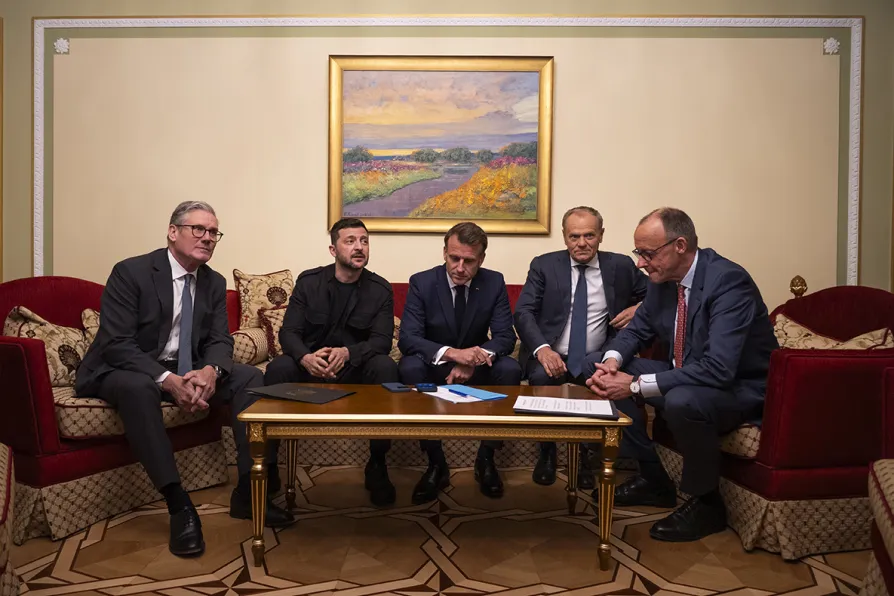
 From left: British Prime Minister Keir Starmer, Ukraine's President Volodymyr Zelenskyy, French President Emmanuel Macron, Polish Prime Minister Donald Tusk and German Chancellor Friedrich Merz make a call to US President Donald Trump from Kyiv, Ukraine,
From left: British Prime Minister Keir Starmer, Ukraine's President Volodymyr Zelenskyy, French President Emmanuel Macron, Polish Prime Minister Donald Tusk and German Chancellor Friedrich Merz make a call to US President Donald Trump from Kyiv, Ukraine,
UKRAINE’S President Volodymyr Zelensky today welcomed Russia’s offer for direct peace talks, but insisted there be a full, temporary ceasefire before negotiations can start.
President Zelensky, writing on X, called Russian President Vladimir Putin’s offer to start talks without a ceasefire a “positive sign” and said that “the entire world has been waiting for this for a very long time.”
He added, however, that “the very first step in truly ending any war is a ceasefire.”
The Ukrainian president said: “There is no point in continuing the killing even for a single day. We expect Russia to confirm a ceasefire — full, lasting and reliable — starting May 12 and Ukraine is ready to meet.”
In remarks early today President Putin effectively rejected the ceasefire proposal, saying direct talks should begin in Istanbul on Thursday instead “without preconditions.”
He said a ceasefire might be agreed on during the negotiations.
Mr Putin’s remarks came after leaders from four major European countries threatened to ratchet up pressure on Moscow if it does not accept an unconditional 30-day ceasefire in Ukraine.
The Russian president said Russia had proposed several ceasefires in recent months including a halt on strikes on energy infrastructure, which Ukraine had agreed to, a unilateral 30-hour Easter truce and another unilateral ceasefire on May 8-10 that has since expired.
Mr Putin said Ukraine sabotaged “these initiatives time and time again” and launched multiple attacks on Russia.
The Ukrainians similarly accuses Russia of breaking all the previous truces.
Mr Putin reiterated today that the Kremlin needs a truce leading to a “lasting peace” instead of one that would allow Ukraine to rearm and mobilise.
He said he would speak to Turkish President Recep Tayyip Erdogan and ask him to facilitate the peace talks on May 15.
In a social media post several hours after Mr Putin’s remarks, US President Donald Trump said it was “a potentially great day for Russia and Ukraine!”
He added: “I will continue to work with both sides to make sure that it happens. The US wants to focus, instead, on rebuilding and trade.”
Kremlin spokesman Dmitry Peskov, in comments aired by Russian TV today, called Mr Putin’s proposal “very serious” and said it “confirms a real intention for find a peaceful solution.”
He added: “The goals of the talks are clear: to eliminate the root causes of the conflict. And also to ensure the interests of the Russian Federation.”

Meanwhile, Nato foreign ministers debate increased weapons spending as police investigate the bloc’s purchases of military equipment












